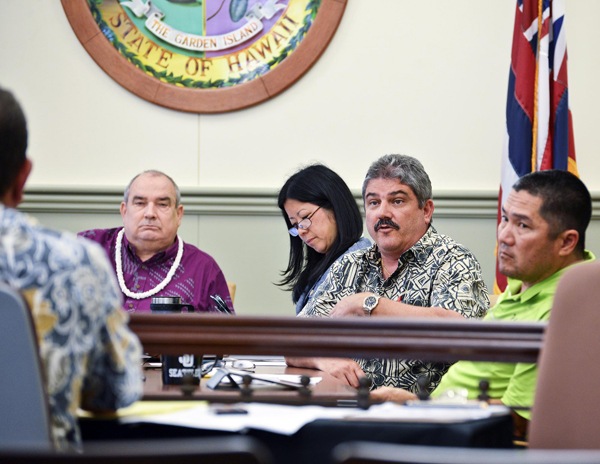LIHU‘E — With an operational budget that is $8.2 million smaller compared to last year’s budget — and utilizing $11.58 million from the county’s reserve fund — the administration still needs more than $14 million to balance the budget for
LIHU‘E — With an operational budget that is $8.2 million smaller compared to last year’s budget — and utilizing $11.58 million from the county’s reserve fund — the administration still needs more than $14 million to balance the budget for Fiscal Year 2014, which starts July 1, according to county officials.
Several fee increases, including new real property tax rates, will help to bring revenues in Mayor Bernard Carvalho Jr.’s proposed budget to $158.5 million.
County Finance Director Steven Hunt presented Thursday to the Kaua‘i County Council the administration’s proposal to adjust property tax rates to every class of taxpayers, except for homesteaders, who have a Permanent Home Use cap in place. This alone would bring nearly $12 million in additional revenues to the county.
Hunt said the “lion share” of the administration’s tax package would not be for residents, rather for hotels, resorts, commercial, industrial and other tax classes.
Additionally, an array of fee increases — fuel tax, commercial trash tipping fees and vehicle registration — would bring an additional $2.16 million to the county.
Councilman Gary Hooser said despite Hunt’s assurances that businesses and industrial operations would take the hardest hit, much of the fee increases would eventually trickle down to residents.
Carvalho said in his State of the County address in March the administration would be looking at removing the PHU cap.
The cap is adjusted annually by Honolulu’s Consumer Price Index. While it protected resident homeowners from the real property market spike that peaked in 2008, the cap is now creating inequities. Owners of properties valued similarly may pay distinct taxes depending on when the value of the property was locked in to activate the cap.
“The cap can’t be removed without an action plan in place,” Council Chair Jay Furfaro said Thursday.
Councilman Tim Bynum made a lengthy presentation earlier in the day, and proposed that the council look into additional tax exemptions for resident homeowners.
“We haven’t changed our tax exemptions (for homesteaders) forever; we really need to look at that,” Bynum said.
Under the current proposal, homesteaders would keep their rate of $3.05 per $1,000 of assessed value. The rates for the residential class would increase to $5.75 from $4.64; rates for vacation rentals would increase to $8 from $7.46; commercial rates increase to $8 from $7.34; industrial rates would increase to $8 from $7.36; agriculture rates would increase to $6.75 from $6.01; conservation rates would increase to $6.75 from $6.43; and hotel and resort rates would increase to $9 from $7.80.
Revenue enhancements
The administration’s proposal would bring roughly $14.16 million in combined additional revenues, broken down as:
• Real property tax rates: $10.99 million
• Fuel tax: $570,000
• Vehicle weight tax: $1.09 million
• Vehicle registration fee: $208,000
• Solid waste tipping fee: $1.09 million
• Planning permit fees: $140,000
• Bus passes: $60,000
The proposed increased for the fuel tax would be 2 cents per gallon, beginning as early as July, which would increase Kaua‘i’s existing fuel tax to 15 cents per gallon, still lower than Honolulu’s and Maui’s tax, according to Hunt. This two-cent increase would reflect an additional $8 annually for those who fill up a 15-gallon tank every other week, he said.
Drivers on Big Island pay almost 9 cents per gallon for a fuel tax, but Big Island has a “disproportional amount” of federal subsidy for their highways, because of Volcano National Park and Saddleback Road, according to Hunt.
The vehicle weight tax’s last increase was in May 1999, when it went from $0.0075 per pound to $0.0125 per pound. The new tax would be $0.0200 per pound for passenger cars and $0.04 per pound for freight vehicles, he said.
The vehicle registration fee would increase from $12 to $17, and would take effect Jan. 1. Kaua‘i has the lowest registration fee in the state. The new fee would equal Big Island’s fees.
Commercial solid waste tipping fees would increase to $119 from the currently charged $90.
Most of the permitting fees at the county Planning Department haven’t changed in more than 40 years, since 1972, according to Hunt.
He said the proposed fee increases are being recommended by Planning Director Michael Dahilig Some of those fee increases are based on CPI multipliers in an attempt to bring them to current dollar value. Other increases are based on amount of time spent in research, processing and enforcement, he said.
Bus fares would stay the same, but passes would increase. The $25 monthly pass would increase to $30; and the $240 annual pass would increase to $300. The $120 six-month pass would no longer be offered.


